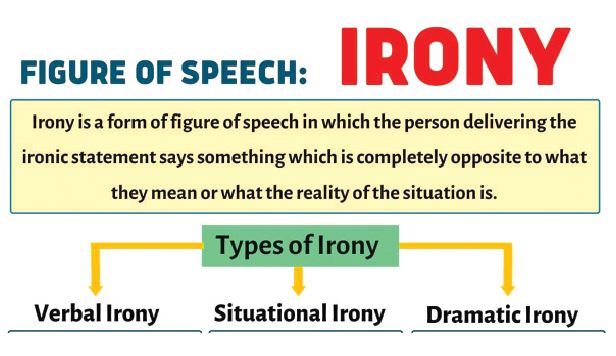Roopa Banerjee
If you suggest something silly to your friend and she says, ‘What a great idea!’ she is probably being ironical.
Irony is the use of words to convey meaning which is the opposite of the literal meaning. A popular literary device, irony is a contrast between expectation of a situation and reality.
 Irony has an interesting etymology. It is derived from the Greek word eironeía which traces its origins to an ancient Greek comic character Eiron, who pretends ignorance to deceive an opponent. Eironeía — meaning ‘dissimulation’ or ‘purposely affected ignorance’ — subsequently entered Latin vocabulary as ironia and became a popular figure of speech in the English language in the 16th century.
Irony has an interesting etymology. It is derived from the Greek word eironeía which traces its origins to an ancient Greek comic character Eiron, who pretends ignorance to deceive an opponent. Eironeía — meaning ‘dissimulation’ or ‘purposely affected ignorance’ — subsequently entered Latin vocabulary as ironia and became a popular figure of speech in the English language in the 16th century.
There are three types of irony: verbal, dramatic, and situational.
Verbal irony. When a person articulates words which are in direct contrast to what she actually means. Contrary to popular belief, verbal irony is different from sarcasm. Sarcasm is used when the speaker intends to be overt and abrasive. A sarcastic person does not try to mask his contempt. However, verbal irony is milder and less inclined to hurt the listener. For example, when former British prime minister Winston Churchill told Labour party politician Bessie Braddock that ‘I shall be sober in the morning, and you will still be ugly,’ he was being sarcastic and not ironic. On the other hand, an example of verbal irony is: ‘What a pleasant day,’ when it may be raining heavily.
Dramatic irony. When the reader/audience knows more than the characters of a story. This often leads to tragic outcomes. For example, in William Shakespeare’s Othello, the reader is aware that Othello’s best friend Iago is evil and intends to destroy Othello. The reader also knows that Desdemona has been faithful and anticipates the impending disaster. Most books, plays and films rely on dramatic irony to make audiences invest emotionally in the characters. The film The Truman Show is a classic example of dramatic irony where everyone except Truman knows that he is being filmed.
Situational irony. When the outcome is very different from what is expected. For example, in The Wonderful Wizard of Oz, citizens of the Emerald City believe that Oz is mighty and invincible, but the man behind the curtain is revealed to be an elderly person with no significant power. Another instance of situational irony is the short story The Gift of the Magi by O’ Henry. A young, destitute couple want to buy each other Christmas gifts. The woman sells her tresses to buy an expensive watch strap for her husband. Meanwhile, the husband sells his watch to buy delicate combs for his wife’s hair. This is an example of situational irony, since the outcome is the opposite of what both parties expected.
Exercise
What type of irony is used in the following examples?
1. In a horror film, the audience is aware that there is a killer in the house, but the lead character doesn’t know.
2. A lady looks out of the window to see a storm intensify. She turns to her friend and says, ‘What wonderful weather we’re having!’
3. A man buys a gun to protect himself. An intruder breaks into his house and shoots him with that same gun.
Answers:
1. Dramatic irony
2. Verbal irony
3. Situational irony























